By Hannah Cahill, Fourth Year Biochemistry
The phrase ‘couples who drink together, stay together’ has been given new, genetic backing from a study by researchers at the University of Bristol, which found that a gene linked to alcohol consumption was correlated in married couples.
It has long been known that drinking habits correlate within married couples, however the root of this phenomena has been difficult to confirm. Alcohol behaviour links to many important social factors that may be playing a role in spouse selection. Additionally, being married may cause a couples drinking habits to converge over time, rather than their initial similarities influencing their choice of partner.
One of the best ways to remove confounding social factors when studying behaviour is to look at our DNA. There are more than 15 mutations identified within the human genome that link to alcohol consumption, and alcohol abuse is a highly heritable trait. Alcohol dehydrogenase (ADH) and aldehyde dehydrogenase (ALDH) gene families are strongly associated with varying alcohol consumption, as they encode enzymes involved in metabolising alcohol.

ADH1B is the gene that encodes alcohol dehydrogenase. A relatively common mutation (rs1229984) within it means that the enzyme works faster, removing ethanol and turning it into the highly toxic acetaldehyde. This means people with this mutation experience more unpleasant reactions to alcohol and worse hangovers, but less of the alcohol buzz. Overall, it reduces their risk of alcohol abuse and can be used as a genetic proxy for alcohol use.
Researchers here at the University of Bristol studied over 47,000 spouse-pairs to investigate both their drinking behaviour and the genetic background of this behaviour. By analysing UK BioBank data, they first confirmed that these couples showed similar self-reported drinking behaviour.
They then looked into which form of ADH1B each individual had. Those without the rs1229984 mutation showed an increase in alcohol consumption of 3.98 units, along with a 1.04 unit increase in their partners alcohol consumption. This showed that alcohol behaviour is influenced by your partners alcohol use. Additionally, they found that the presence or absence of the mutation was consistent within spouse pairs. These results suggest that there is non-random mating on the ADH1B gene, which is likely to be related to its effect on alcohol behaviour.
...spouse pairs are more genetically similar to each other
The study revealed correlation in drinking behaviour and genotype between couples; however, these correlations are not necessarily the sole drivers in partner selection. While there must be some degree of selection on alcohol consumption, the rs1229984 mutation is associated with a number of downstream social factors such as years in education and socio-economic variables which will no doubt play a large part in who you decide to settle down with.
Speaking to New Scientist, Laurence Howe, who worked on the project, explained how this study has built on previous studies which relied mainly on self-reported alcohol behaviour by using genetic analysis; ‘This [study] suggests that alcohol consumption directly influences mate choice, adding to the growing evidence that humans are more likely to select a similar mate.’

It’s not just alcohol behaviour that we seem to converge with. While it is known that humans marry people who are behaviourally and socially similar to them, the rise in genomic analyses has revealed that in general, spouse pairs are more genetically similar to each other. Similarities in genes such as the ‘love hormone’ oxytocin and its receptor have been reported in various studies and are linked to successful marriages.
There are even websites such as genepartner.com which offer matchmaking based on DNA analysis for only $249 a pop. However, while genetics is emerging as a key factor in mate choice, we are far from truly understanding it’s influence alongside environmental and social factors, and perhaps this money would be better spent on some dazzling dates than a dodgy DNA test.
Featured Image: Unsplash / Julia Nastogadka
Want to get involved? Get in touch!









